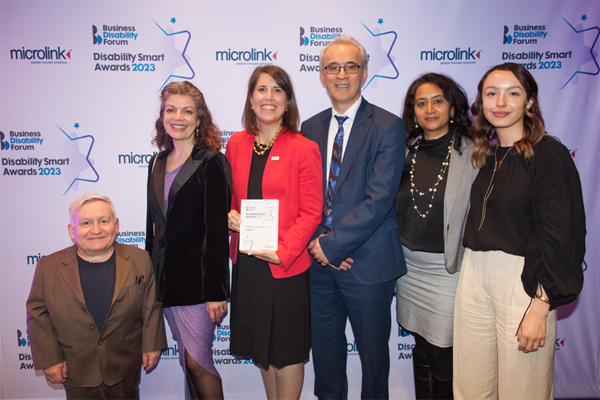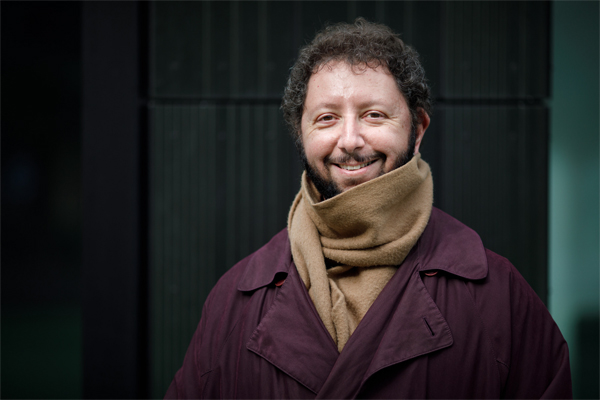
In this week’s interview, Peter Korn – Amazon’s Director of Devices Accessibility – shares how the company has been creating accessible services and products with people with disabilities for over a decade, which helped the company win the Business Disability Forum’s Disability Smart Technology award this year.
Fair Play Talks: Can you share some of the challenges that customers with disabilities face, and how your product/tech specifically help to overcome some of these challenges?
Peter Korn: If you’re shopping, and in a wheelchair, half of store shelves are out of reach. If your vision is poor, it’s hard to tell what aisle you are on. If you’re blind, every can looks the same. When it comes to entertainment, there are large print books, but not for every book. Which makes no difference if you have a mobility disability and the pages are too thin to turn. Amazon is uniquely well-positioned to be the best places for customers with disabilities to shop, enjoy entertainment, and connect with loved ones. Endless window shopping, online of course, is possible. Shopping is as easy as saying, “Alexa, add milk to my shopping list.”
Books and movies are available in accessible formats. Of course, let’s not forget the ability to drop in on loved ones with a connected Amazon device, like an Echo Show. Nearly everything Amazon does is of outsized importance to customers with disabilities. Our vision for accessibility is that Amazon is not just the everything store, but the everyone store. We want to make our products and services not just accessible to the customers with disabilities, but delightful for them.

Fair Play Talks: Can you share how you work with the disabled community to create/improve products to ensure they improve the quality of life of disabled employees and customers?
Peter Korn: First, as much as possible, we hire accessibility experts who themselves are people with disabilities. AmazonPwD, our employee affinity group for people with disabilities, is a source of additional expertise for product design feedback, user research feedback, and product innovations. We supplement this with close partnerships with disability organisations like the National Federation of the Blind, United Spinal Association, and Hearing Loss Association of America.
We don’t want to make products for people with disabilities, we want to make products with people with disabilities. These are not separate products or services, it’s for everyone. Take for example, the Fire TV. A blind principal engineer on our team designed the voice interface for it. Yet it is a product for everyone. Similarly, the Echo Show is a device for everyone. A blind principal user researcher designed the customer experience for the Show & Tell feature.
Collaborations with companies like Starkey hearing aid and Cochlear hearing devices further enable us to advance compatibility so that the same Fire TV bought for hearing customers can also stream audio directly into a hearing aid and device.
Fair Play Talks: As the winner of this BDF’s Disability Smart Technology award, can you share a bit of background on how your tech/products have benefited disabled customers globally?
Peter Korn: We have been innovating on behalf of our customers with disabilities for over a decade. Around the world, customers with disabilities are enjoying our innovations in shopping and entertainment.
Our goal has been for all customers to know how they can use their Amazon devices in their preferred way. Whether it’s offering inclusive customer service to our customers with disabilities for shopping questions, or the Reading Ruler on the Kindle reading app to help improve a reader’s concentration and focus, or the thousands of audio described and captioned titles on Prime Video, these accessible and inclusive products and services are enjoyed across the globe.
In a previous article on About Amazon, we highlighted one customer, Eric, who uses Amazon devices and Alexa daily. He says, “When I first got out of the hospital in 1998, my only options for assistive technology were an early service that used my breath to activate technology or very rudimentary prototypes of what would one day become technology like smart plugs. But they weren’t covered by my insurance, so they were expensive. In addition, they weren’t readily available for the average consumer as you needed a referral from your doctor to be able to purchase them. When I found Alexa, I realized how a smart device could be a total game changer for people like me. That was when I bought my first Echo Dot.”
Fair Play Talks: How did you feel about winning this year’s Disability Smart Award?
Peter Korn: We are honoured to be recognised by the Business Disability Forum with the Disability Smart Award for Technology. We are thrilled and humbled by the reactions of our customers and the greatest endorsement come from our customers with disabilities, whose lives are impacted by Amazon’s accessible devices. Above all, the work is never done!
Fair Play Talks: What innovations are you working on next and what can we expect to see in the near future to improve accessibility for disabled customers?
Peter Korn: These are exciting times for accessibility. With the rise of AI and other new technologies, there is a real opportunity to make advancements in accessibility and continue to make products and services that serve everyone. We recognise the work we do can make a huge difference in people’s lives. As Amazon ventures into new areas, we know many of these initiatives may have outsized importance to people with disabilities. We have a responsibility – and are excited to – continue making a positive difference over the next 10 years and beyond.
Disability Smart Awards 2024 will open for entries on 1st December 2023.






































